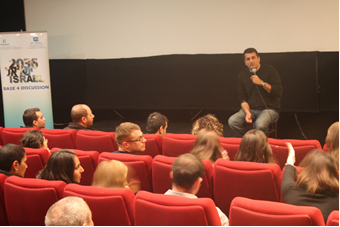Israel: Challenging perceptions among the Russian-speaking community

Recently, members of the Russian-speaking community in Israel had the opportunity to attend a screening of the documentary film "The Gatekeepers" that was nominated for an Academy Award. The event was part of Interpeace's work in Israel that engages influential actors from the Russian-speaking population in the peace process. Following the screening of the film, participants were able to ask their questions to the director of the movie, Dror Moreh.
"The Gatekeepers"
The film portrays six former heads of Shin Bet, the Israeli secret service agency, and allows them to share their views on the peace process and the future of the Middle East. To the surprise of large parts of the audience, these prominent figures of Israeli society are now promoting a negotiated solution between Israel and Palestine as the only option for peace even though they had previously advocated a hardliner position in their roles as heads of the secret service. Based on their experiences in the intelligence agency and their work with Palestinians, the group portrayed in the film unanimously advocated for a negotiated settlement.
"Most of the participants were really surprised to learn that the views of the protagonists had turned around completely. To hear from six former heads of the secret service that they are regretting large parts of their actions has been quite shocking for some members of the audience. I could really feel that tensions among the participants were rising," explained Dina Libster, Programme Officer. "A lot of the questions for the director were consequently related to the authenticity of the testimonies."
Challenging beliefs and perceptions
"The movie challenged the beliefs of the participants and caused them to question their own perceptions," adds a participant who is a senior reporter at the Russian channel in Israel. "This caused grievances of the Russian-speaking community to openly come to the forefront. A lot of them are frustrated with the current political leadership that asks the Russian-speaking community to make large sacrifices, but in the end it turns out the leadership is not making the right choices. This is leading to a change of attitudes and mind-sets among members of the Russian-speaking community and might increase their openness to a negotiated peace."
Social media has a multiplier effect
After the meeting participants continued to share their views and discuss impressions of the event on social media. Sharing the messages of the film with members of their networks and communities increased the exposure and impact of this event. Some of the participants were even interviewed by an Israeli Russian-speaking TV channel, thus amplifying their own impressions further.
The Russian-speaking community as a key stakeholder for peace
Interpeace started to work with the Russian-speaking population, which makes up 20% of the Israeli population, back in 2009. The core group that is regularly participating in peacebuilding activities is composed of influential media actors, political advisors and young entrepreneurs. Due to their large influence on political and public opinion, the consideration of this group is critical for reaching a sustainable peace agreement. Interpeace works with this group to include their voices in the development of a vision for the future of Israel.
Interpeace's work in Israel
Interpeace's programme in Israel, Base for Discussion (B4D), engages marginalized groups of Israeli society in the peace process. Through its work, B4D is targeting more than half of the Israeli population – the Russian-speaking community, Palestinian-Arab citizens of Israel and the traditional religious population.
The Interpeace initiative in Israel, Base for Discussion is jointly implemented with the United Nations Development Programme (UNDP) and supported by the European Union Partnership for Peace programme.
